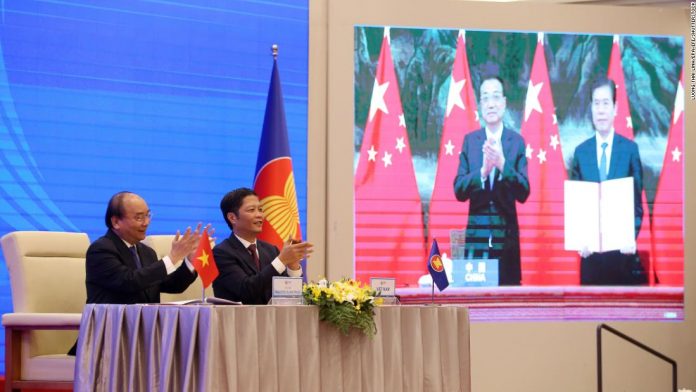The formation of the world’s largest free trade bloc will spur negotiations on the China-Japan-South Korea free trade agreement and promote economic and trade growth and regional economic integration in East Asia, experts said.
Bai Ming, deputy director of the international market research department under the Ministry of Commerce, said the Regional Comprehensive Economic Partnership (RCEP) agreement signed on Sunday (Nov 15) marks Japan’s first trade deal with both China and South Korea.
“The RCEP agreement will lay a solid foundation for the advancement of the China-Japan-South Korea free trade agreement negotiations,” Bai said.
“Under the agreement, China will further open its doors wider to the outside world, which will give even more impetus to the free trade talks.”
Currently, Japan and South Korea are China’s fourth-and fifth-largest trading partners, with bilateral imports and exports valued at 1.8 trillion yuan ($274 billion) and 1.62 trillion yuan respectively on a yearly basis during the first 10 months of the year, according to data from the General Administration of Customs.
Due to the rising protectionism and mounting downward pressure on the global economy from the Covid-19 outbreak, China needs a safe external environment to boost its domestic market, Bai said.
“The RCEP platform will improve China’s surrounding external environment and the country will be able to build the new ‘dual-circulation’ development pattern, which puts the domestic market as the economic mainstay while the domestic and foreign markets complement each other.”
Bai said that China and Japan have agreed on a bilateral tariff reduction mechanism, a historic breakthrough.
“The new agreement will promote high-level trade liberalisation in the region. China and Japan, the world’s second-largest and third-largest economies, will jointly deal with the current situation, inject new impetus into the economic growth of each other as well as the Asia-Pacific region.”
Wang Peng, a distinguished research fellow with the Center for Hong Kong, Macao, Taiwan and World Affairs at the Communication University of China, said the economies of China and Japan are highly complementary and the two countries have immense potential to expand economic and trade cooperation in several fields.
“The RCEP agreement will boost economic growth in both countries and provide a new platform to move forward the China-Japan-South Korea free trade agreement negotiations,” Wang said.
“In the future, the three countries will be able to reach high-level economic and trade deals on the back of the RCEP agreement.”
Lou Feipeng, a researcher with Postal Savings Bank of China, said the bilateral tariff reduction arrangement between China and Japan will spur economic and trade exchanges in both the nations and with the rest of the world.
“The RCEP will lower tariffs and aims to counter protectionism, boost free trade, investment and tourism within the region. Under the new agreement, China, Japan and South Korea will carry out economic and trade cooperation in accordance with the RCEP rules,” Lou said.








